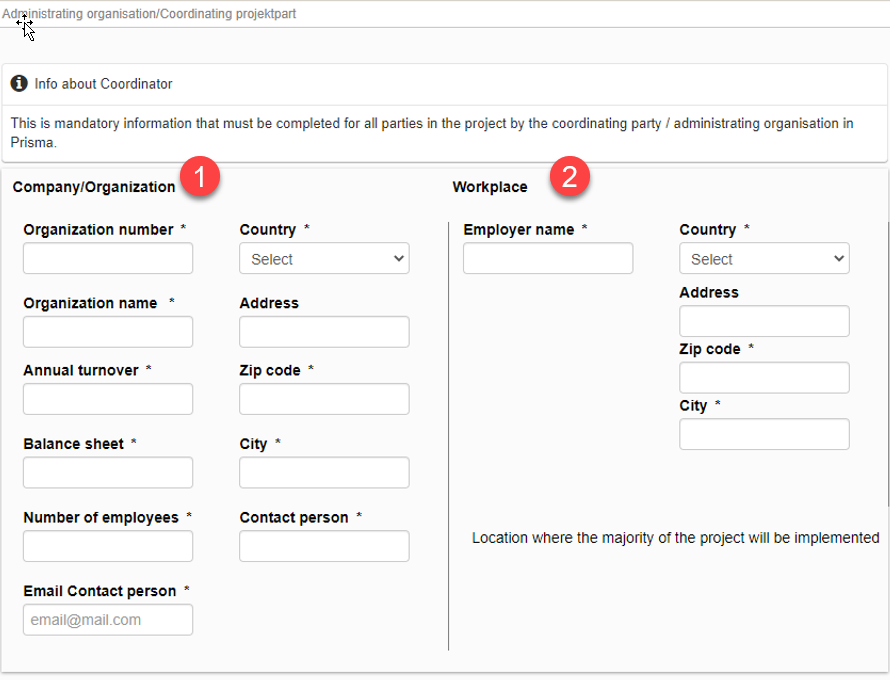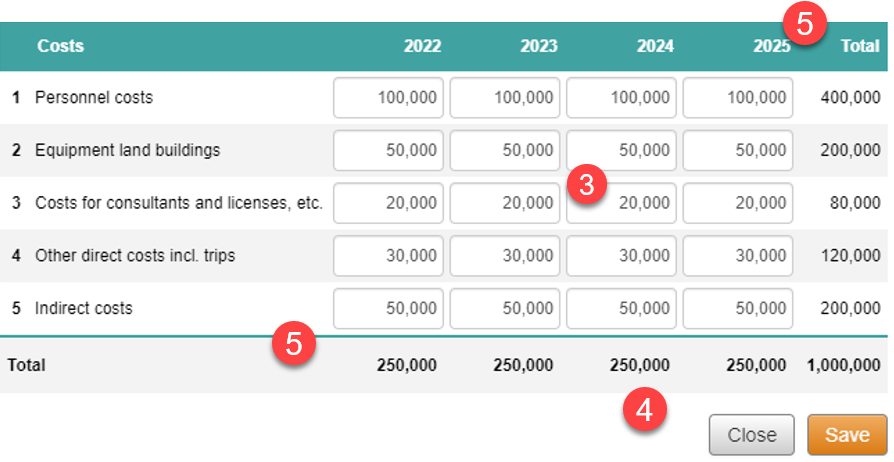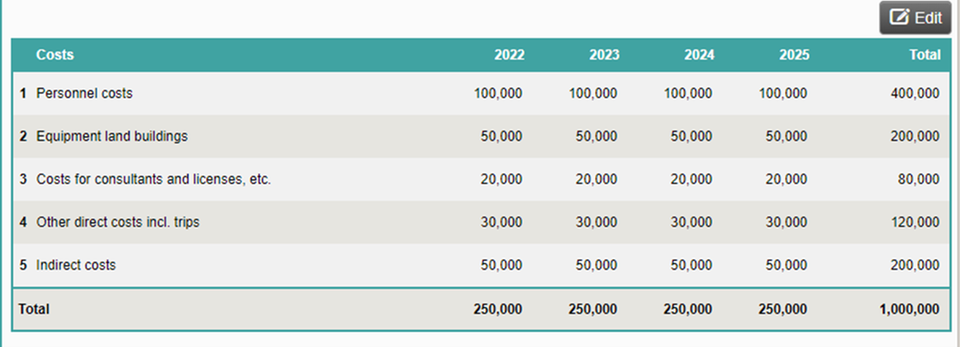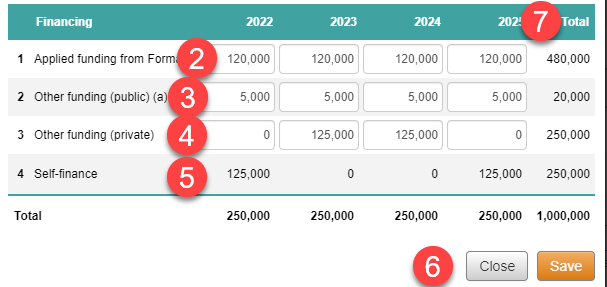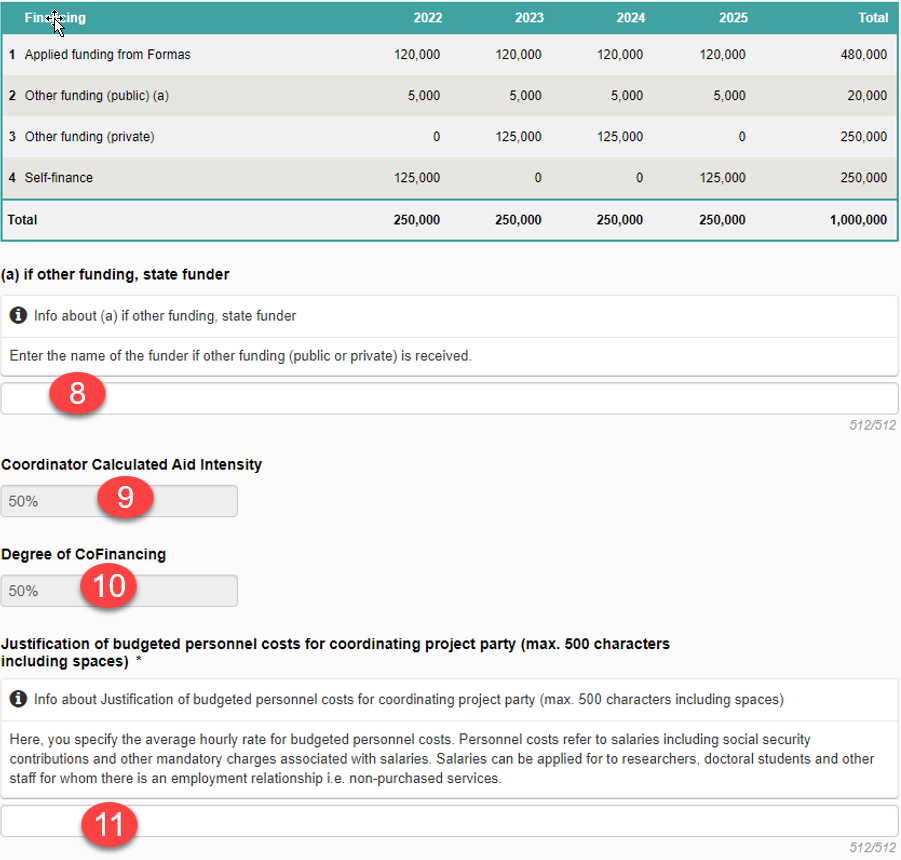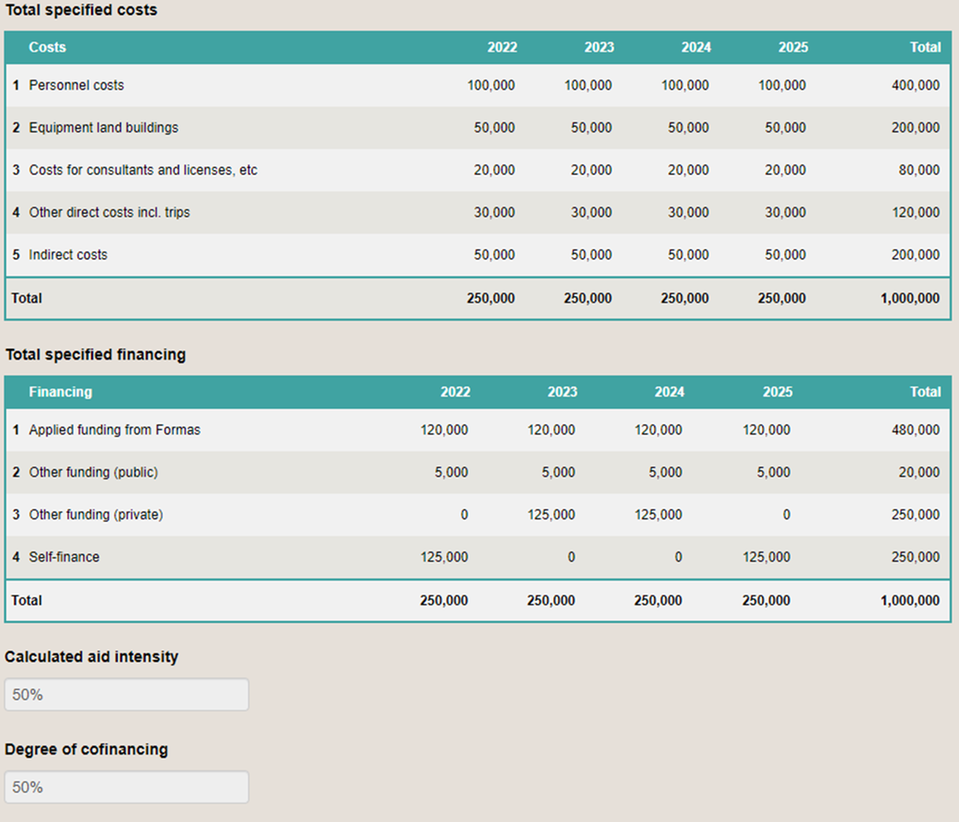Preliminary decisions. Please note that only decisions published in Prisma is a guarantee of granted funding.
Registration number | Applicant First Name | Applicant Second Name | Administrating organisation | Project Title | Funded amount, SEK |
|---|---|---|---|---|---|
2023-02311 | Sepideh | Olausson | Göteborgs universitet | Designing Future Sustainable Critical Care Settings | 3 987 400 |
2023-02315 | Ivette | Arroyo | Lunds universitet | Planning and development of Collaborative Housing and Shared Housing as Intermediate Forms of Housing for promoting older adults’ health and well-being | 5 998 001 |
2023-02325 | Daniel | Berglind | Karolinska Institutet | Reconstructing schoolyards with greenery to increase schoolchildren´s physical activity and health and mitigate climate changes in urban areas | 5 927 308 |
2023-02326 | Helena | Nordh | Sveriges lantbruksuniversitet | RULES AND TOOLS – safeguarding neighbouring green space for human health and well-being | 6 000 000 |
2023-02331 | Cecilia | Fåhraeus | Uppsala universitet | Communal green spaces for wellbeing? Using participatory action research for inclusive green space design for slum dwellers in Zambia. | 5 796 059 |
2023-02333 | Camilla | Berggren-Tarrodi | RISE Research Institutes of Sweden AB | How neuroarchitecture can provide solutions to build resilience for mental Health and eell-being in an urban context | 5 999 031 |
2023-02339 | Jenny | Lindén | IVL Svenska Miljöinstitutet AB | Designed urban greenery for a healthy living environment | 5 999 990 |
2023-02354 | Adriaan | Uittenbogaard | Övertorneå kommun | Attractive Arctic Places - how we meet under the northern lights and midnight sun. | 5 841 599 |
2023-02366 | Erika | Andersson | Region Västmanland | PLATSMO - Places facing structural head wind - (re)newed methods to promote changes in the development of people´s everyday landscapes in both urban and rural areas. | 3 208 452 |
2023-02368 | Agnieszka | Årevall | Alvesta kommun | Mission driven area-based initiative for health and well-being | 4 412 570 |
2023-02375 | Louise | Skålberg | Härryda kommun | Framework for Enriching Design of Living Environments | 5 950 000 |
2023-02388 | Lars | Albinsson | Maestro Design & Management AB | Playbook for New Health and New Urban Patterns | 2 400 000 |
2023-02391 | Emma | Pihl | FOJAB arkitekter AB | Poetry of Movement - new perspectives on rooms for sports and physical activity | 2 856 505 |
Apply for a grant for research and innovation projects that provide new or more in-depth knowledge and solutions for how designed living environments can promote human health and well-being. The call places great emphasis on different sectors and stakeholders working together to develop these solutions.
The call is being implemented within the framework of the national research programme for sustainable spatial planning. The call addresses the programme’s goal of contributing to living environments that have a positive impact on public health and relates to the theme of human health and well-being.
The total budget for this call is SEK 40 million.
There is a clear link between physical design and people’s health and well-being. The way our communities and societies are planned, built and designed affects how we work, live, socialise and move from place to place. This, in turn, affects our health and well-being. Good an equal health increases the quality of life for individuals while providing socio-economic benefits, including reduced costs for health and medical care. An understanding of health-promoting living environments and of how the built environment impacts our health and well-being is therefore central to spatial planning.
Since 2018, Sweden has had a comprehensive policy in place for what are called designed living environments. Such environments include all the built and natural environments where we live, work, play and spend our time: residential buildings, schools and hospitals, and public spaces including parks, streets and squares. The designed living environment covers architecture, design, public art and cultural heritage areas in the built environment. Spatial design involves managing and developing existing environments as well as the design and placement of future construction. In a carefully designed environment, form, function and sustainability interact, helping to improve health, well-being and overall contentment.
The strategic agenda , 1.3 MB. for the national research programme for sustainable spatial planning identifies the need for more knowledge and solutions around how living environments are designed and how the built environment can contribute to increasing people’s health and well-being. Health and well-being are affected by aesthetic, artistic and cultural-heritage values, access to daylight, noise levels, access to nature and recreational areas, and play environments.
, 1.3 MB. for the national research programme for sustainable spatial planning identifies the need for more knowledge and solutions around how living environments are designed and how the built environment can contribute to increasing people’s health and well-being. Health and well-being are affected by aesthetic, artistic and cultural-heritage values, access to daylight, noise levels, access to nature and recreational areas, and play environments.
The purpose of the call is to provide knowledge and solutions that promote health and well-being through the design and development of living environments. The call places great emphasis on different sectors and stakeholders working together to develop these solutions.
Living environments include the places and buildings where people reside, work and live their lives, including public spaces with parks, streets and squares. The designed living environment includes how architecture, form, public art and cultural heritage areas can encourage the creation of human habitats that are sustainable in the long term and are well-designed.
The call welcomes research and innovation projects that specifically investigate and suggest how to shape a designed living environment so it makes a positive contribution to people’s health and well-being. This can involve, for example, planning, construction, renovation, management, guidelines, regulations, follow-up and use of the built environment.
Examples of relevant areas for the call are:
- Planning and development of the built environment, such as designing and siting buildings and infrastructure in relation to each other, and how to develop environments between buildings to best promote good health and well-being.
- Renovation, conversion and development of existing buildings and areas. The cities and communities of the future are largely already built, but they need to adapt and evolve if we are to create sustainable environments characterised by good health and well-being.
- Designing living environments, such as green spaces, that can promote mobility and activity among diverse groups in society like the elderly, young people and people with disabilities.
- Designing buildings and living environments to counteract mental illness and loneliness.
- Property development and material selection that support healthy indoor and outdoor environments in terms of factors like daylight, noise and air pollution.
Formas encourages creative project proposals that address both social and environmental sustainability aspects in both the design and use of different types of living environments. Projects are encouraged to link design with other issues and initiatives, for example regarding climate adaptation measures and energy efficiency measures, in order to create synergies that can promote health and well-being.
Projects can address any relevant development phase or consideration, from planning to a building’s architecture, from the local level to the national level, and from rural to urban. You can also study international cases to learn key lessons that can be applied in a Swedish context.
The call as a whole and funded projects are expected to produce the following:
- New or more in-depth knowledge and novel solutions for how designed living environments can promote health and well-being.
- Collaboration across disciplines and sectors, as well as different types of organisations.
- Results that lead to changed built environment practices in Sweden or abroad.
Strengthened expertise around design issues linked to health and well-being in society.
In order for applications to be assessed as being within the purpose and focus of the call, the project’s focus must be on design and development considerations that clearly relate to people’s health and well-being. You must also clearly state in the application how the project will help to develop practices that support sustainable spatial planning.
Projects that are assessed to fall outside the purpose and focus of the call cannot be awarded a grant and will be rejected prior to review. Only complete applications will be assessed with regard to whether they fall within the scope of the call. Assessments are therefore only made after the call closes.
The call is aimed at a wide range of stakeholders, such as municipalities, property owners, architectural firms, industry and interest organisations, non-profit organisations and researchers from all disciplines. Research-performing organisations (higher education institutions or research institutes) as well as companies, public organisations and other organisations are welcome to apply for a grant.
The call welcomes projects that promote collaboration across disciplines as well as cross-sectoral collaboration between academia and the sectors, stakeholders and organisations that will design and support a sustainable built environment. In the projects, researchers and end users should work together with the aim of developing solutions or processes that can be applied and make a real-world impact in society.
The project team must consist of at least one party from a research-performing organisation and at least one that is an end user from the business sector, the public sector or other relevant organisation, such as a trade or interest organisation. A maximum of five project parties may be included in the project, including the main applicant’s organisation.
The project team must include at least one researcher with a doctoral degree (obtained by the time the call closes), but this person does not have to be the coordinating project party (main applicant). Other participants do not need to have a doctoral degree.
Before you apply
All information about the contents of an application, the application process and the assessment process is described in the sections below.
Note that this application procedure and application form differ from Formas’ regular calls for research projects. Learn more under the heading “How to apply”.
All projects seeking funding from Formas must have a responsible project leader and be carried out by the people listed in the application. The project leader must be affiliated with the main applicant’s (coordinating party’s) organisation. He or she does not need to be employed but can be engaged as a consultant in the project.
The main applicant’s organisation (a coordinating party) must be able to receive and administer the funds Formas pays out to an awarded project. The organisation that will receive and administer the funds Formas pays out to an awarded project is called an administrating organisation.
Formas distinguishes between administrating organisations that can seek funds in all Formas calls, and administrating organisations that can be approved to receive funds in an individual call. The main applicant’s organisation must have an organisation account and be approved as an administrating organisation in one of these two forms.
Higher education institutions, government agencies with research assignments and most research institutes are approved as administrating organisations in all Formas calls. Most other organisations must be approved to receive a grant for an individual project. See also “How to apply”.
Who can become an administrating organisation?
Employees at Swedish higher education institutions, research institutes, public organisations, companies and other private organisations can apply for a grant in the call. Sole proprietorship businesses cannot be granted funding. Any applications involving one or more parties that are sole proprietorships will be rejected.
The project must include at least one researcher with a doctoral degree (obtained by the time the call closes). However, this person does not have to be the main applicant (project leader).
It is not permissible to be the main applicant for more than one application in this call. However, you can be a project participant in several applications as long as the applicant’s total grant amount, distributed over the projects, does not exceed 100 percent.
It is possible for applicants to simultaneously have an ongoing project grant from one of Formas’ other targeted national and international calls, the annual open call or both, as long as an applicant’s total salary, distributed over the projects, does not exceed 100 percent funding.
Several types of organisations must participate in the project and be represented by a higher education institution or research institute and one or more end users who are not from a research-performing organisation. It is up to the project to put together the most suitable project team. This is part of the assessment criteria under “How does the assessment process work?”.
A project party is defined as an organisation that actively participates in the project and is added as a project party in Prisma with associated costs stated in the budget field (see “How the main applicant fills in and checks the budget and other information”). This applies regardless of whether the organisation applies for a grant from Formas or participates in-kind. A consultant or subcontractor is not a project party.
There must be a minimum of two (2) and a maximum of five (5) project parties.
Private companies and other organisations engaged in economic activity that want to apply for a grant from Formas are subject to state aid rules. See also “State aid rules for companies and other organisations engaged in economic activity”.
When you apply for project funding, you can apply for a grant to cover both direct and indirect costs. Examples of direct costs are staff expenses or other costs that are directly attributable to the project. Direct costs also include costs for any consultants or subcontractors. Indirect costs are costs that are shared with others in your organisation, such as for administration, IT and renting of premises. Indirect costs are sometimes called overhead.
Learn more under the heading Information your application must include, subheading Budget and other information.
| Year 1 | Year 2 | Year 3 | Total |
|---|---|---|---|---|
Example 1 | 1,500,000 | 1,500,000 | 1,500,000 | 4,500,000 |
Example 2 | 1,200,000 | 2,000,000 | 1,300,000 | 4,500,000 |
| Year 1 | Year 2 | Year 3 | Total |
|---|---|---|---|---|
Applied funding | 1,200,000 | 2,000,000 | 1,300,000 | 4,500,000 |
Self-financing | 50,000 | 300,000 | 250,000 | 600,000 |
Total | 1,250,000 | 2,300,000 | 1,650,000 | 5,100 000 |
Private companies and other organisations engaged in economic activity that want to apply for grants from Formas must follow specific regulations on state aid. The regulations are based on the principle of EU law, which states that aid to private enterprises normally distorts competition but that certain exemptions are allowed.
The aid intensity that Formas can offer depends on the size of the organisation and the type of activities in the project. The organisation’s size is assessed using the EU definition of small and medium-sized enterprises. Activities will primarily be assessed on the basis of Article 25 of the General Block Exemption Regulation EU 651/2014. The aid intensity depends on the eligibility and the size of the company. Read more in Aid intensities and definitions for grants under Formas’ aid scheme , 216.6 kB. (in Swedish only).
, 216.6 kB. (in Swedish only).
For more information, see State aid regulations.
De minimis aid
In the call, Formas may also apply Commission Regulation (EU) No 1407/2013 on the application of Articles 107 and 108 of the Treaty on the Functioning of the European Union for de minimis aid. The maximum aid Formas can grant is 200,000 euros (roughly 2 million kronor) over three tax years. All de minimis aid to an organisation is added together when the ceiling amount is taken into account. Read more about aid intensities in Aid intensities and definitions for grants under Formas’ aid scheme , 216.6 kB. (in Swedish only).
, 216.6 kB. (in Swedish only).
You can, but do not need to, attach a statement of de minimis aid to the application by filling in a dedicated template, which should be signed by an authorised representative of the organisation. The document should then be scanned and uploaded as a PDF in Prisma. Formas may also request such a statement if it is considered relevant.
Formas’ statement of de minimis aid , 39.9 kB.
, 39.9 kB.
Separate accounting and ancillary activities
For applicants who carry out both economic and non-economic activity and who intend to contribute their non-economic part in the call, you can attach a statement of separate accounting and ancillary activities , 778.4 kB.. Formas may also request such a statement if it is considered relevant.
, 778.4 kB.. Formas may also request such a statement if it is considered relevant.
Sole proprietorships
Sole proprietorship businesses cannot be granted funding under this call or participate as a party to projects that are applying in Formas’ calls. Any application involving a sole proprietorship as a party will be rejected.
International organisations
Companies or other organisations engaged in economic activity that do not have a Swedish corporate identity number cannot be awarded a grant in this call, but can instead participate in-kind. However, they can participate as consultants or be paid according to the guidelines of the project party (administrating organisation) and current legislation.
We recommend that you write your application in Swedish, since the review panel members who will assess your application are from the Nordic countries. If you write your application in English, a professional translator will translate into Swedish only the section describing the project. You will not be able to change the translation before the application proceeds to assessment. Your budget specification and CV will not be translated. So, please write these in Swedish, even if you write the application and other sections in English and submit your application in the English version of our application system.The popular science description must be written in Swedish, while the abstract should be in both Swedish and English.
According to Swedish law, your application and its appendices are considered as general public documents once they have been submitted to us. This means that anyone can request and read your application. Information can only be concealed if it is confidential as defined in the Public Access to Information and Confidentiality Act (2009:400).
Formas has limited possibilities to keep personal data confidential. Therefore, your application should not contain the personal data of anyone who is not included in the application.
The popular science description and project abstracts in Swedish and English will, if the project is awarded funding, be published in open-access project databases without a confidentiality review. Therefore, the contents of these fields should not contain sensitive information.
How to apply
You apply in Prisma
You apply for a grant in our application system, Prisma, where you add the information you need for your application.
Plan ahead and fill out your application well in advance before the call closes. If mandatory fields do not have the required information filled in when the application is submitted, it will not be possible to submit the application. It is possible to register an application, then withdraw it and register it again an unlimited number of times before the call closes. Once the call is closed, you cannot submit or add information to the application, unless specifically requested by Formas.
The information and instructions that follow describe personal and organisation accounts in Prisma. Please read these instructions carefully, even if you have previously applied for a grant from Formas.
Personal account
The main applicant who fills in the necessary information and registers the application must have a personal account in Prisma. If the designated main applicant does not have a personal account, the person must apply for it in good time before the call closes.
Apply for a personal account in Prisma External link..
External link..
Organisation account
The organisation that will receive and administer the funds Formas awards to a project is called an administrating organisation in Formas’ application system. At the time of application, the organisation must have an organisation account.
When the main applicant fills in the application form in Prisma, they must state the administrating organisation and so-called project site. This is done in the drop-down menus for administrating organisation and project site. The project sites that the applicant can select are retrieved from the organisational structure based on the organisation account settings defined by the manager of the organisation account. The administrating organisation represented by the main applicant (the coordinating project party) must have an organisation account in Prisma when applying for funding.
If your organisation has not previously been an administrating organisation for Formas’ funds, then your organisation must apply for an organisation account with Formas in Prisma (see below).
Formas distinguishes between administrating organisations that can receive funds in all Formas calls, and administrating organisations that can be approved to receive funds in an individual project.
Main applicants from administrating organisations approved for all types of calls
Higher education institutions, most research institutes and government agencies with research assignments are approved as administrating organisations for all Formas calls and already have an organisation account.
Main applicants from administrating organisations that can be approved administrating organisations for an individual project
Companies, municipalities, trade associations and other organisations can apply to become administrating organisations for an individual project. These organisations must have an organisation account with Formas.
Organisation account for organisations that can become administrating organisations for an individual project
- If the organisation already has an account in Prisma, please contact our research officer Anna Kuznetcova to request that the organisation be added to the list of possible administrating organisations for this call. State your organisation number in your email, even if the organisation has been approved as an administrating organisation for a project in one of Formas’ previous calls.
- If your organisation does not have an account in Prisma, an appropriate representative should apply for the organisation account on the Prisma website. In the reason for the application, state that you are applying under Formas’ call “Designed living environment for health and well-being”, and state the type of organisation and the organisation’s corporate identity number.
Apply for an organisation account in Prisma External link..
External link.. - If you do not know whether your organisation has an account, contact research officer Anna Kuznetcova by email before you apply for a new account. State your corporate identity number.
Important: The main applicant must apply in good time for an organisation account for the intended coordinating project party (the administrating organisation) if it is not listed in Prisma, but no later than 10 October 2023.
Project site – create a structure to describe your organisation
For you to be able to register an application, a project site must be stated for the organisation. A project site can be an institution or a department, for example. The person who manages the organisation account must create a structure of units and sub-units (domiciles) in two levels. If the organisation does not have departments, specify a subunit that has the same name as the organisation. For information on how to do this, see Prisma’s user support External link..
External link..
Learn more about creating project sites and viewing levels for project sites in Prisma External link.
External link.
All limits for the maximum number of characters refer to characters including spaces. We recommend that you choose the Arial font in font size 12 for the information you enter in all text boxes.
Note that if you write your application in word processing software and then paste it into Prisma, the formatting might disappear. So, tables and figures that contain advanced formatting or formulas should be uploaded as an attachment in order to prevent the loss of valuable information.
Your application must include a clear description of the project under the following sections:
Basic information
- Number of years applied for (2, 3 or 4).
- Start month. The start month is predefined in Prisma and cannot be changed.
- Project title in Swedish and English (200 characters including spaces).
- Popular science description in Swedish (4,500 characters including spaces).
- Abstract in Swedish and English (1,500 characters each, including spaces). The popular science description and project abstracts for awarded projects will be published in open-access project databases without a confidentiality review. Therefore, the contents of these fields should not contain sensitive information.
Project description
Read the background and the call’s purpose and focus carefully before you write the project description. The project description must clearly describe the project based on the assessment criteria under “How does the assessment process work?”. Address all the criteria in your application. The assessment criterion specifically for ethical considerations is stated under “Ethical considerations”.
The project description should include the following information:
Relevance and potential (max. 10,000 characters including spaces)
Background
- Describe the background and context of the project so that also those who are unfamiliar with the area can understand the project and its relevance.
- Describe the challenge the project addresses, any previously tested solutions and the lessons learned from them.
Purpose and goals
- Describe the project’s purpose and goals and how they can contribute to fulfilling the purpose and focus of the call.
Societal impact
- Describe the project’s potential to provide knowledge or solutions, and in what way they are innovative.
- Describe the benefits to society the project can provide, in the shorter and longer term, and how the projects meet the current needs of public organisations, the business sector and/or civil society.
- Describe how and where the project’s results should be disseminated or scaled in order to achieve societal impact, and how the project will support this.
Implementation (max. 12,000 characters including spaces)
- Explain how the project will be carried out – include, for example, work packages, activities, methods, work plan and schedule.
- Clearly describe which project parties and project participants are active in which parts of the project.
- Describe how gender equality, equity and diversity will be integrated into the implementation of the project, and reflect on how this helps to develop society in terms of gender equality, equity and inclusion.
Participants and actors (max. 8,000 characters including spaces)
- Describe and motivate the choice of project parties, and the project participants’ competencies, roles, and involvement in the project.
- Describe how the project will consider the interests of the project parties and other end users.
- Reflect on the project team’s composition (key stakeholders) with regard to gender and distribution of influence among women and men.
References (max. 5,000 characters including spaces)
List the references used to substantiate your project description. These can include research, publications, government inquiries, previous studies relevant to the project, and similar material. You can choose the format to use to write your references.
Budget and other information
You state the project budget, funding and other information about all organisations participating in the application in Prisma. Note that you should always write the budget specification in Swedish; any English budget specification will not be translated but will instead be assessed as is by the review panel.
In Prisma, write out the total amount you are applying for in kronor using digits. For example, SEK 1 million should be written as: 1 000 000 kronor.
The following information must be stated in the project budget.
Information about the main applicant’s organisation and each project party
This is mandatory information and must be completed for each party in the project. The information should be collected and filled in by the main applicant. The main applicant´s organisation must be the same as the administrating organisation. See the section “How the main applicant fills in and checks the budget and other information” for detailed instructions.
- Name of the organisation
- Corporate identity number
- Address, postal code, city, country
- Annual turnover (the total sales or turnover of the higher education institution, research institute, company or organisation during the previous fiscal year), stated using digits. Example: 3 500 000.
- Balance sheet total (the sum of either the assets page or liabilities and equity from the company’s or organisation’s balance sheet), stated using digits. Example: 5 500 000.
- Number of employees
- Contact person
- E-mail of contact person
- Name of the workplace, address, postal code, city and country where most of the work will be carried out.
Costs
- Personnel costs: Funding is available to cover actual salary costs for time spent on the project. This applies both to companies and other organisations engaged in economic activity (which are subject to EU state aid rules) as well as other types of organisations. For employees of higher education institutions or research institutes, the amount must never exceed 100 percent of full-time employment. This also means that someone who is already receiving full salary funding from any other funder cannot receive additional funding for salary. Researchers who are full-time pensioners cannot receive funding for their own salary.
- Equipment, buildings and land: The total maximum amount you can be granted for equipment and equipment depreciation costs is 500,000 kronor.
The costs of equipment, buildings and land are eligible to the extent and for the duration of their use in the project. For equipment and buildings, depreciation costs incurred during the life cycle of the project are eligible, for land the actual capital costs are eligible, but with the limitation as described above. - Consultancy and licensing costs: For the costs of consultancy services and licenses to be eligible for funding, they must be purchased or licensed from external providers at market prices, and their services and scope must be stated in the project description.
- Other direct costs: Other direct costs can include the cost of consumables, travel, conferences and publication fees for open-access journals and databases.
- Indirect costs (overhead): Higher education institutions and research institutes may charge a markup for indirect costs according to the applicable full-cost pricing method. Other project participants may charge a markup for indirect costs of up to 30 percent of their eligible staff expenses. Formas does not grant funds for overhead on costs that you write off for equipment or for premises.
Financing
There are four types of funding that can be stated for each party in the project:
- Applied funding from Formas: Indicates the amount requested from Formas under the call. The annual amount sought cannot exceed the costs for each year. If the amount sought is less than the total costs, the remaining amounts will be automatically calculated and reported under “Self-finance”.
- Other funding (state): If Formas or another public funder has provided funding for related projects.
- Other funding (private): If another private company or organisation has provided funding for the project.
- Self-finance: If the project party contributes its own funding, this is calculated automatically and displayed in the field for self-finance.
Justification of budgeted personal costs (max. 500 characters including spaces)
Here, you specify the average hourly cost for budgeted staff expenses. Staff expenses refer to salaries including social security contributions and other mandatory charges associated with salaries.
Budget specification (max. 9,000 characters including spaces)
In the principal applicant’s own words, they should explain the budget and state the overhead costs included in the application. Formas does not grant funding for overhead costs that you write off for equipment or premises.
Here, you also specify any consultancy costs and the scope of the consultant’s participation. Also specify which project participants will pay for the consultancy costs. The applicant is encouraged to clearly describe all costs related to the project activities.
Ethical considerations
You should specify whether or not there are specific ethical concerns in your project. If so, state what these ethical concerns are and how you plan to manage them. Examples include research that uses personal data or research involving experiments on humans or animals. If not, briefly state why not.
If you are conducting research on humans or human tissue or are processing sensitive personal data, you must submit an application for ethical review to the Swedish Ethical Review Authority and have it approved. If you are conducting an animal experiment, you also need to obtain approval from a relevant animal ethics board. You can apply for approval through the Swedish Board of Agriculture’s online service.
You should state in your application whether or not you have obtained a valid ethical approval. If you have not obtained such approval and you are awarded a grant, you must obtain it before the described studies begin.
Even if you do not expect your research to involve ethical concerns, you should state this in your application and briefly explain why not.
Classifications
Formas uses the project’s classifications in analyses and supporting documentation on an overall level. The classifications are made when the applicant states the subject area, research subject (SCB code), at least one sustainable development goal the project can contribute to, and keywords.
- Subject area. Select the project’s subject area and add a sub-heading.
- Research subject (SCB code). Select at least one research subject and two sublevels that together form the entire code.
- Sustainable development goals. Select at least one and up to three sustainable development goals (SDGs) the project can help to achieve, in order of relevance.
More about the meaning of the goals External link.
External link. - Keywords. Enter at least one and a maximum of three keywords describing the project.
Mandatory appendices
Project participants
List of project participants. State all project participants including their name, organisation and role in the project. Save the document as a PDF file and upload under mandatory appendices in Prisma. You can only upload files in PDF format in Prisma.
CVs
Upload a CV including relevant qualifications for each key stakeholder as a single PDF of a maximum of 4 MB and maximum 1 A4 page per person.
In this call, researchers at our generally approved administrating organisations cannot link to CV information that has already been registered in Prisma. This is done to enable an equal assessment of applications and CVs.
The CV should contain relevant information demonstrating the key stakeholder’s qualifications and skills that are important in the project. This can include experience from relevant research, implementation, collaboration and project management.
Each CV should contain the following: Name, Sex, Organisation, Title, Participation in percent, Role in the project, Relevant skills and experience, Reason why the person is a key stakeholder in the project, Other.
Optional appendices
Illustrations, figures and maps
You can, but are not required to, upload maps, figures, tables and illustrations that are relevant for the application. Upload these as a single PDF in Prisma (max. 4 MB).
Statement of separate accounting and ancillary activities
This statement should be signed by an authorised representative of the organisation and then uploaded as a PDF in Prisma. Formas accepts e-signatures. Download the statement of separate accounting and ancillary activities External link..
External link..
Statement of de minimis aid
This is used by companies to declare that the de minimis aid ceiling is not exceeded. Formas accepts e-signatures. Download Formas’ statement of de minimis aid External link..
External link..
Letters of intent
Letters of intent from participating parties or other stakeholders reporting their commitment can be attached to the application. Upload these as a single PDF in Prisma (max. 4 MB).
Coordinating project party
Fill in information about the coordinating project party
- Enter the company/organisation and the associated information for the organisation
- Indicate the workplace, the place where the main part of the project will be carried out, and the associated information for the workplace
Fill in the costs for the coordinating project party
- Click on Edit
- The columns for years come from the project time specified in Basic Information. Go back to Basic Information in your application if you want to edit this.
- Fill in costs for each type of cost and year.
- Click on Save and Close.
- Total costs are automatically calculated in the summary fields.
Fill in financing for coordinating project party
- Click on Edit
- Fill in the applied funding from Formas, per year
- If applicable, fill in other funding received from another public funder
- If applicable, fill in support received from another private financier
- Self-financing is calculated automatically based on what is stated in the cost and financing sections.
- Click on Save and Close.
- Total financing is calculated automatically in the aggregated fields.
- Enter the name of the funder if other funding (public or private) is received.
- Funding (aid) density is calculated automatically in percent.
- Degree of co-financing is calculated automatically in percent.
- In the motivation field, state how the average hourly cost for budgeted personnel costs has been calculated.
Project party
Click on Add project party for the project party or the project parties that will participate in the project, in addition to the coordinating project party (administrating organisation).
Fill in the sections for information, budget and financing for each project party in the same way as described for the coordinating project party. See section Coordinating project party above. Information for the project parties is to be filled in regardless of whether the project party is applying for a grant, ie. financing, from Formas or not. If project parties do not apply for funding from Formas but only participate In-kind, budgeted project costs must be stated for these project parties but enter SEK "0" in the field "Applied funding from Formas" under financing for these project parties.
Note that a subcontractor to the applicant does not constitute a project partner in the application.
The project total specified costs and financing
Following the budget charts for coordinating project party and other project parties, total specified cost of the project and total specified financing respectively are calculated automatically.
Control how you have completed the budget charts in good time before you register your application. Applications with incorrectly completed budgets may be rejected. Control all budget charts per project party including the coordinating project party and charts for Total specified costs and Total specified financing respectively as follows:
- You have entered all project partners who participate in the project.
- You have specified applied funding from Formas for all the project parties that intend to receive funding from Formas.
- You have stated other funding for those project parties who, if applicable, have it.
- You have the self-financing required by state aid regulations for companies and other organisations, where relevant.
After submitting your application
You can make changes to your registered application, de-register it and register it again up until the call closes at 14:00 on Tuesday, 17 October 2023. Once the call is closed, you cannot submit or add information to the application unless errors have been found in Prisma or unless specifically requested by Formas.
Your completed application is automatically sent to the administrating organisation after the call is closed.
First, Formas verifies that the application meets the procedural requirements set out in the call. If the application does not meet these requirements, it is rejected. The following requirements will be verified in this call:
- The administrating organisation has signed the application. This must be done within seven calendar days after the call closes.
- The application has been approved by the administrating organisation.
- The application’s focus falls within Formas’ areas of responsibility.
- The focus of the application falls within the purpose and focus of the call.
- The application is complete and contains all mandatory information.
- The requirements for project managers, project participants and organisations under “Applicant and organisation requirements” are met.
- The requirements for the sought grant amount and project duration under “Grant amount and project duration” are met.
- A credit check has been done on all participating companies and other organisations engaged in economic activity that may be relevant for awarding a grant.
- The main applicant responsible for other projects or activities funded by Formas has submitted any requested reports by the stated deadline.
All applications are assessed by an external review panel based on the contents of the application. It is therefore important to write the application as clearly as possible and include all important and relevant information. The review panel consists of active researchers and users of research results. Each application is read by four assessors from the panel.
In this call, Formas will apply a portfolio perspective to enable funding of projects that address a wide range of challenges and perspectives within the framework of the call. The portfolio perspective will be considered by the review panel only after each application has been assessed on its own merits.
The applications are assessed based on the following criteria.
Relevance
- The project can significantly contribute to the purpose and focus of the call.
- The design of the project and the expected results have taken into consideration the relevant needs and conditions of different groups in society.
- The project’s expected results can make a significant real-world impact.
Potential
- The problem formulation and purpose of the project are clear, logical and in line with the purpose and focus of the call.
- The research or accumulated knowledge that underpins the project is of high quality and is relevant.
- The project is innovative and has significant potential to provide knowledge, new approaches or new solutions.
- How project results will be turned into to societal impact is clearly described and is fit for purpose.
- The project has significant potential for scalability and/or dissemination.
Implementation
- Planned activities and methods are realistic and appropriate for achieving expected results during the project.
- The time frame and budget are realistic and appropriate in relation to the purpose and objectives of the project.
- Gender equality, equity and diversity are integrated in the project implementation
- Ethical considerations are well described and the plan for addressing them is appropriate.
Participants and actors
- The project’s organisation and overall competence of the project group are appropriate for the implementation of the project, including the utilisation of the project’s results.
- The project is carried out in collaboration with relevant end users and stakeholders, and safeguards their interests.
- The project team (key actors) as well as the distribution of influence is well balanced between women and men. Relevant for project teams of more than 3 people.
A decision on which projects will be granted funding is expected to be made in March 2024. The exact date has not yet been determined. We publish our decisions the following day at the latest on the Formas website and later by email from Prisma. Grant award decisions cannot be appealed.
All projects must submit a final report to Formas containing expenses and project results within three months of the end of the grant availability period. For projects longer than 18 months, a financial statement must also be submitted to Formas annually. All reports are submitted in Prisma.
Read more about financial reporting in Prisma.
Formas may set additional requirements on project reporting in terms of content and results in order to enable dissemination and real-world impact. In such cases, the award decision will contain more information about this.
Awarded projects are expected to participate in seminars and dialogues with other projects funded through this call, as well as in conferences and networks within the framework of the national research programme for sustainable spatial planning, Formas may also set additional requirements for conference participation and similar in order to create synergies and platforms for learning and knowledge exchange.
Results of research funded by Formas must be published using open access.
You must also have a data management plan for the data produced in the project. This plan does not need to be submitted to Formas, but should be presented on request. By signing our grant terms and conditions, you certify that a data management plan will be available before the research begins and that it will be maintained.
SweCRIS
Formas shares information about awarded grants to SweCRIS External link., a national database of grant-funded research that was instituted by request of the government.
External link., a national database of grant-funded research that was instituted by request of the government.
Coordinating project party
An organisation that coordinates the project and is an administrating organisation, meaning it receives funding from Formas and transfers the funds to other organisations that are project beneficiaries, reports the project according to instructions, and notifies Formas of any changes.
Note that only Swedish organisations can be coordinating project parties.
Project party
An organisation that implements the project, regardless of whether it receives funding (i.e. it provides its own funding). A subcontractor is not a project party.
Note that companies or other organisations engaged in economic activity outside Sweden cannot receive grants in this call. However, they can participate as project parties if they contribute in kind.
Main applicant
A person appointed by the coordinating project party as the project leader.
Project participant
A member of the project team such as a participating researcher or participating non-researcher.
Administrating organisation
The administrating organisation is the organisation that receives funding from Formas and transfers the funds to other organisations that are project beneficiaries, reports the project according to instructions, and notifies Formas of any changes.
Administrating organisation for all types of calls
An organisation that can seek funding from Formas in all types of calls. These are higher education institutions, research institutes and government agencies with research assignments.
Administrating organisation for an individual project
An organisation that can apply for funding from Formas through individual calls and receive funding for an individual project. These are private companies, associations, trade associations, boards of directors, funds and municipalities.
Project site
A project site can be an institution, department or project specialisation.
Revision history
Any post-publication revisions to the call text are listed below.
2023-08-16: Expected grant award decision date updated to March 2024.
2023-09-25: Under Language, we updated that the translation of the the section describing the project, will be into Swedish, and not Engslih, as previously stated.
Meetings and webinars
Contact information
For questions about the content of the call
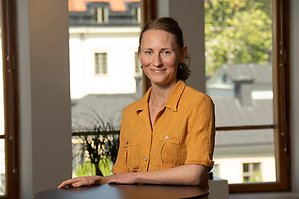
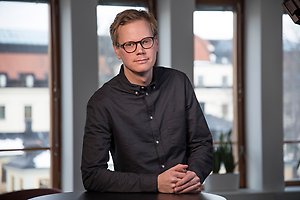
Jon Loit
Leave of absense
For administrative questions and questions about Prisma
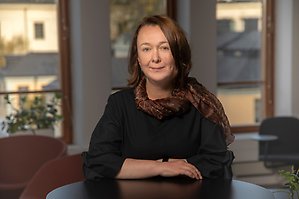
For questions on budgeting and funding for businesses
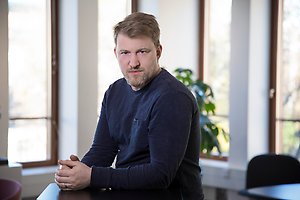
Johan Hansson
Leave of absense




